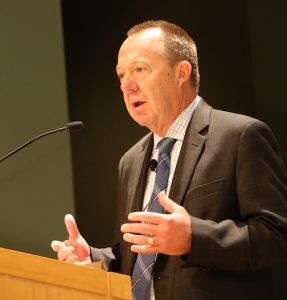WASHINGTON, DC – Over the past few days, I’ve heard from several individuals at AAHomecare member companies and state/regional associations who are looking for perspective on what last week’s surprising resignation of HHS Secretary Tom Price means for our advocacy priorities. In particular, people want to know how this news affects the Interim Final Rule (IFR) providing relief for non-bid areas currently under review at OMB, as well as our work on long-term reforms for the bidding program. Unfortunately, there is not any established precedent to draw on in answering these questions.
What I can offer is that AAHomecare has a plan to get much-needed relief for our industry. What follows is a summary of where we currently stand and how we plan to continue to move forward to achieve success in these areas.
 As I noted above, the IFR titled “Durable Medical Equipment Fee Schedule, Adjustments to Resume the Transitional 50/50 Blended Rates to Provide Relief in Non-Competitive Bidding Areas” has been at OMB for final review since late August. Thanks to strong outreach by HME companies nationwide, 104 Members of Congress endorsed a Congressional sign-on letter asking OMB to clear the IFR.
As I noted above, the IFR titled “Durable Medical Equipment Fee Schedule, Adjustments to Resume the Transitional 50/50 Blended Rates to Provide Relief in Non-Competitive Bidding Areas” has been at OMB for final review since late August. Thanks to strong outreach by HME companies nationwide, 104 Members of Congress endorsed a Congressional sign-on letter asking OMB to clear the IFR.
We have also met with OMB to provide HME industry perspective on the need for relief for non-bid area suppliers and will be sharing our full final report on the impact of competitive bidding on HME patient access with the OMB, HHS and CMS by the end of the week.
In addition, our champions on Capitol Hill are working on legislation to provide relief for rural providers in the event that the IFR does not move forward from OMB.
While we still hope to see the IFR released in the near future, we believe we are well positioned to move forward with legislation to address the issue. Fortunately, the engagement by the HME community to build support for the above-mentioned letter to OMB, the House letter on multiple policy issues in June, and a July Senate sign-on letter focused on rural relief have all helped keep this issue visible on Capitol Hill.
Although we have lost a strong advocate at HHS, we have established good working relationships with other leaders who remain at HHS and CMS. Additionally, we have brought on consultants with a long track record of working with these agencies who have contributed significantly to our successes so far. These consultants’ expertise and credibility within the Agencies will be especially important in our ongoing efforts to get long-term fixes for the bidding program.
I believe we are well-positioned to advocate for these policy priorities going forward. I hope that suppliers, manufacturers, and other HME stakeholders will continue their excellent efforts to build relationships with their representatives in the Senate and House (including making sure to thank those individuals who signed onto the OMB letter last week) and be ready to build support for rural relief legislation should it be needed.
I look forward to working with you all to build on the progress we’ve made so far this year and to bring home some much needed policy wins for the HME community.
HHS OIG Releases Report on Medicare Overpayments
WASHINGTON, DC – The Dept. of Health & Human Services’ Office of Inspector General (OIG) has released a report titled “Enhancements Needed in the Tracking and Collection of Medicare Overpayments Identified by ZPICs and PSCs.”
The report is part of OIG’s continued efforts to examine overpayments by Medicare. OIG reviewed overpayments that were referred by program safeguard contractors (PSCs) and zone program integrity contractors (ZPICs) to Medicare administrative contractors (MACs). In fiscal year 2014, 80% of overpayments referred by ZPICs and PSCs were not collected. OIG found shortcomings in how the contractors tracked and reported overpayments. In this report, the OIG recommends CMS to improve and standardize the tracking and reporting of overpayment referrals/collections. OIG also recommends CMS to require surety bonds for home health providers and other at-risk providers.

